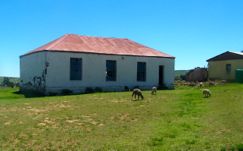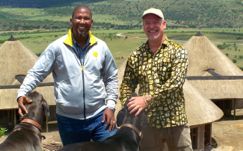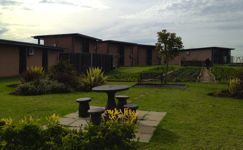Cultural experiences
Exploring the culture that made Mandela
-
"I have the most pleasant recollections and dreams about the Transkei of my
childhood, where I hunted, played stick-fighting, stole mielies on the cob and where I
learnt to count." - Nelson Mandela, Long
Walk to Freedom
Trip to Mvezo
Guests fly either to East London, Port Elizabeth or Mthatha, and are collected from the airport for the drive to Mvezo, on the banks of the Mbashe River - and Mandela's birth place. It is the seat of the Mvezo Traditional Council, and the home of Mandla Mandela, Mandela's grandson. Mandla has built a museum about Xhosa history and the Mandela family. A hotel and backpackers lodge are also on the cards. There's also the Mandela School of Science and Technology, built by Siemans after a promise was made to Mandela.- Read more: Mandela's Mvezo school dream realised
Mqhekezweni, the Great Place
A highlight is the trip to Mqhekezweni, the "Great Place" of the Thembu tribe that made the great man. After his father died when he was nine, Mandela and his mother walked to Mqhekezweni, or "place of learning", where he was entrusted to the care of Chief Jongintaba, the Thembu regent. Under the regent's mentorship he received an education and attended university. "Mqhekezweni is key to understanding Thembu culture and custom, but also offers us a look at some special places in the 'teenage' Mandela story," Ukubona Africa writes on its website. "For instance, we can still see the hut he shared with the regent's son, Justice, and we visit the Bityi train station, from where the two planned to flee to Johannesburg to escape their arranged marriages." Visitors can stop at the school Mandela attended and the church where he learned to love gospel hymns. They can also picnic under the famous gum trees of Mqhekezweni and listen to the stories of the guide, as Mandela did to the elders of the Thembu tribe. Thembu elders today explain that tolerance of all people is a foundation of their tribe; Mandela was its proudest advocate. It was here, sitting in on and listening to Jongintaba's council, that Mandela learned his diplomacy - and democracy. Jongintaba gave every person a chance to speak; and everybody had to listen to the other's opinion, explains Neil. Mqhekezweni is a very spiritual place. It is quite different from anything else you can experience on the more common Mandela pilgrimages.Rhythms of life
The main attraction of the Nelson's Transkei tour is to see how life unfolds. Visitors can follow his journey from Mvezo at birth, to Qunu at two with his family and then to Mqhekezweni at the age of nine with his mother. From there, the tour drives to Port St Johns on the coast, about an hour away, to share in the traditional lifestyle and culture of the Amapondo. Here there are plenty of options for visitors: the sardine run usually takes place between June and August; there are sea safaris, cultural excursions, walks and hikes, and visits to a sangoma, where guests are able to get a better understanding of the Xhosa and Pondo cultures. The idea is that this is authentic learning about the culture that created Mandela.Nelson's names
Nelson Mandela was known by many names and titles:- Rolihlahla: literally meaning "pulling the branch of a tree" and figuratively meaning "trouble-maker", this was his birth name.
- Mandela: his surname, this was inherited from a kingly Thembu great- grandfather.
- Nelson: this was the English name his teacher, Miss Mdingane, gave him.
- Dalibhunga: meaning "founder of the Bunga (council)" or "convenor of the dialogue", this name was conferred on him by tribal elders and Chief Jongintaba on his initiation in homage to his late father.
- Madiba: this was his most tribally important name as this "clan" name or "isiduko" linked him to an ancestor, a 19th century Thembu chief.
- Tata: meaning "father", this is a term of endearment used by close family and comrades.
- Khulu: meaning "great one", this was said in tribal deference.
- uBawomkhulu: meaning "grandfather".
- Black Pimpernel: this was coined by the press when he was on the run.
- 46664: this was his prisoner number.
Details and contacts
The tour is a three-night package, but it can be extended. It costs about US$200 per person per day (minimum two people), including some meals, guides and all entrance fees. The price excludes accommodation and some meals. Breakfasts and dinners are usually included in the accommodation prices in Port St Johns.- Ukubona Africa: ukubonaafricatours.co.za
- General enquiries: info@ukubonaafricatours.co.za
- Tel: +27 (0)21 447 6327

The rolling hills of the Transkei, the birthplace of Nelson Mandela (Photo: Ukubona Africa)

The primary school at Mqhekezweni that Mandela attended as a young boy (Photo: Ukubona Africa)

Mandla Mandela, the grandson of Nelson Mandela, and tour guide Neil Johnson, co-owner of Ukubona Africa (Photo: Ukubona Africa)
 The Nelson Mandela Museum in Qunu (Photo: Ukubona Africa)
The Nelson Mandela Museum in Qunu (Photo: Ukubona Africa)
Related articles
- Interactive museum to honour SA's struggle heroes
- Places to visit on Madiba's Journey
- New, in-depth study of Mandela's image, legacy
- Mandela's 'Speech from the Dock' - 50 years on
- Sod turned at Mandela children's hospital
- Map to help travellers 'walk in Mandela's footsteps'
- Mandela's Mvezo's school dream realised
- Dreaming big dreams in Qunu
- Nelson Mandela's long walk ends at last
- Mandela's memories of his childhood village
- Qunu museum gives life to Mandela's legacy
- Qunu residents share their 'Madiba moments'
- Nelson Mandela: son of Qunu returns to the soil
- How Mandela chose love over tribal custom




